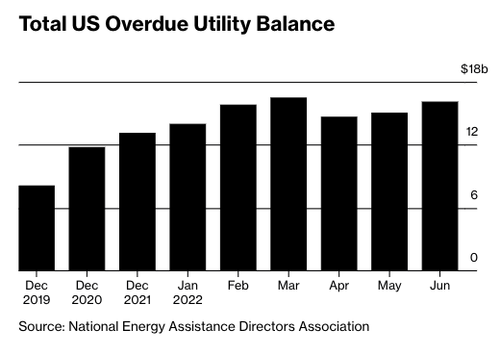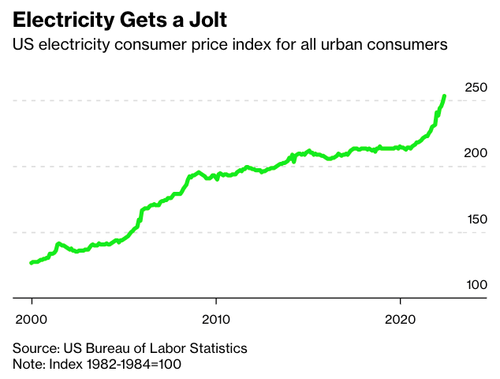“Tsunami Of Shutoffs”: 1 In 6 US Homes Are Behind On Power Bills
At least 20 million households — or about 1 in 6 American homes — are behind on their power bills as soaring electricity prices spark what is said to be the worst-ever crisis in late utility payments, according to Bloomberg, citing data from the National Energy Assistance Directors Association (Neada).
Neada said electricity prices had increased significantly since 2020 after a decade of stagnation. The steep rise has resulted in billions of dollars in overdue power bills.

Electricity inflation is being propelled by soaring costs of fossil fuels, such as natural gas, coal, and petroleum.

NatGas fuels about 40% of the US power grid and soared to the highest levels since 2008 on Tuesday.
The chart below shows for the two decades, real electricity prices were relatively flat, except for the commodity boom times around the 2008 GFC. Now CPI less energy has peaked, though electricity continues to rise to a blistering 30% year on year.

Utility shutoffs have become more common across the US as some lower-tier households are thousands of dollars behind on their power bills.
Jean Su, a senior attorney at the Center for Biological Diversity, which tracks utility disconnections across the US, warned of a “tsunami of shutoff” as the highest inflation in forty years eats away wages and has financially devastated the working poor.
Adrienne Nice is one of those struggling Americans who is more than $3,000 behind on utility bills. Last month, she received a “final notice” from power company Xcel Energy Inc., who turned off the electricity to her studio apartment in Minneapolis as temperatures approached near triple digits.
Nice found it near impossible to save money for utility expenses that have doubled over the past year as food, shelter, and gas prices have also skyrocketed. Her low-paying job as a housecleaner has left her in energy poverty.
“I just don’t understand how electricity can be so high,” she said.
Across the country, power companies reported a surge in non-payment customers. California’s PG&E Corp said there had been a 40% jump in the number of residential customers behind on payments since February 2020. New Jersey’s Public Service Enterprise Group said customers at least 90 days late have risen 30% since March.
“People on the bottom, they can’t pay” their electricity bills, said Mark Wolfe, Neada’s executive director.
Readers know that low-tier consumers are financially tapped out. They’ve maxed out credit cards, depleted savings, and have seen wage gains wiped out due to inflation. It comes as no surprise the US is becoming more like Europe, where energy poverty has doomed millions of households.
It’s only a matter of time before the Biden administration starts handing out stimmy checks for electricity bills.
Tyler Durden
Thu, 08/25/2022 – 04:45
via ZeroHedge News https://ift.tt/P32r0ce Tyler Durden






